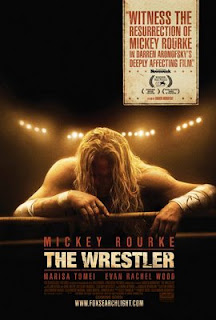
Darren Aronofsky has yet to produce a film that’s not worth watching on some level, and THE WRESTLER is one of his better ones. Though I’m one of those who liked his exercise in contemplative sci-fi existentialism known as THE FOUNTAIN, it’s good to see him back to Earth and focusing on something rawer. THE WRESTLER, written by Robert D. Siegel, is in some ways a conventional story, but its attention to detail and relentless tight focus on its protagonist keeps it feeling real and vital. Of course it’s got an amazing performance by Mickey Rourke in the lead, and Marisa Tomei does some great work as well, and the film owes a great deal of its success to them. Whoever was responsible, though, it’s a fine work.
Rourke plays Randy “The Ram” Robinson, a veteran pro wrestler still pumping along at middle age. Not quite in the big leagues anymore, Randy tends to do smaller arena gigs for various wrestling federations. He takes a lot of painkillers and struggles to pay the rent on his trailer, but seems comfortable in his routine. But it all changes when he suffers a heart attack shortly after a particularly brutal prop-laden fight against (real-life wrestler) Necrobutcher (aka Dylan Summers.) He’s given an emergency bypass, and after that even a brief jog brings him to a stop. He has to retire, even canceling a reunion rematch with famed archnemesis The Ayatollah (Ernest Miller, also a wrestler IRL), and take a demeaning job at a grocery store deli counter. Without his career he doesn’t have much, except a friendly relationship with Cassidy, a local stripper (Tomei.) She advises him to get back in touch with his family, but his only family is his daughter (Evan Rachel Wood), who’s cold to his offers of friendship after years of abandonment.
Aronofsky tones down his usually high level of visual experimentation for this story, but he’s not any less attentive to how it works. The focus, of course, is on Randy, and frequently, for long stretches, the camera is set right behind him, seeing what he sees but keeping him a presence in the picture. He’s almost never off-screen, and the time we spend with him allows us to see him from many angles. To the children he’s a lovable giant, to his daughter he’s a deadbeat, to Cassidy he’s a nice guy to be kept at a slight distance. Mickey Rourke captures all these facets while still showing a coherent and consistent character. Tomei gives a similarly deep performance- her character is, on one level, the clichéd “stripper with a heart of gold”, but she shows her character’s uncertainty about how she wants to deal with Randy and what she wants to do with her own life in general. She, like him, is getting too old for what she does, but has few other options. Needless to say, both of these actors have gotten Oscar nods for a very good reason.
The filmmakers have obviously done their homework as regards pro wrestling, as you might gather from the number of actual pro wrestlers in the cast. The matches we see are never fully rehearsed- instead the fighters discuss what stunts they’ll pull and, in one particularly amusing scene, go through a general store finding various trays and chairs to use on each other. Obviously nothing they do is as damaging as it looks (we even see Randy’s use of “blading”, as it’s known, to make the hits look bloodier than they are), but it’s still punishing, and the prop-heavy match between Randy and the Necrobutcher is especially brutal. The film obliquely criticizes the more unforgiving aspects of the pro-wrestling business- Randy’s retirement doesn’t come with any workman’s comp or Social Security, and he’s clearly aged well beyond his years- but it also has a great respect for the spectacle itself, and the sacrifices wrestlers make to accomplish it. One of the better details is a nicely authentic 8-bit Nintendo game replaying Randy and the Ayatollah’s match, and the protagonist’s love of 80s hard rock makes for a suitably intense soundtrack.
On occasion the conventional nature of the story becomes a potential liability. Tomei’s stripper (whose real name is Pam) is, of course, a single mother, and she even does the bored premature stage exit that seems common for movie characters in this profession. A few plot turns are similarly familiar for whatever genre this is, and though conventionality is not really a flaw, its seems out of place in a film this naturalistic. Of course, it never goes exactly the way you expect, and I was particularly impressed by the ending, which goes in a somewhat risky direction.
This is a film with many splendid moments- the scenes of Randy at the deli counter are strangely entertaining, as is his encounter with a young barfly with an... unusual fetish. The full effect is more of a slow burn, but it stays with the viewer. A superb picture on a number of levels, and I'm still wondering whether someone in AMPAS has a grudge against Aronofsky.
Written by Robert D. Siegel
Directed by Darren Aronofsky
Grade: A




